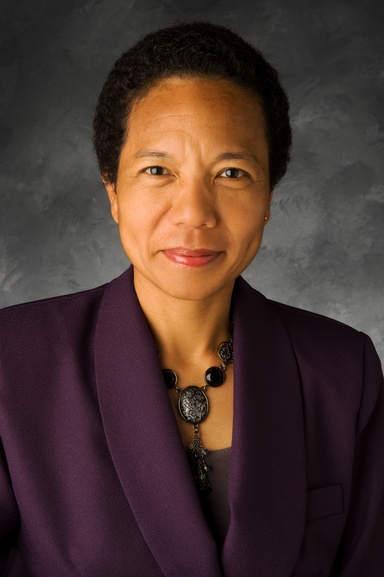Editor's note: This is an archived article. The content, links, and information may have changed since the publication date.
The University of Iowa’s new Campus Inclusion Team, announced Wednesday during the UI's annual Update on Diversity and Inclusion, will provide support, resources, and tools to help students respond to concerns of racial, ethnic, gender, intellectual, political, and religious bias on campus.
The specially trained team will provide empathetic listening, data gathering, assessment, and referrals for additional services, including how to report a formal complaint. The CIT evolved from student requests for the UI to create a mechanism for reporting incidents of bias on campus.

Due to concerns about its effect on academic freedom and freedom of speech, UI officials decided a sounding-board approach would be a better fit than a more formal bias response team.
“Our No. 1 goal is to ensure all students are treated with respect and feel welcome on our campus,” says Georgina Dodge, UI’s chief diversity officer. “The Campus Inclusion Team will provide a central place for students to voice concerns to professionals who will help them identify the issue and develop a plan for how the student might approach the person who exhibited the behavior and work out a mutually satisfactory solution.”
The Campus Inclusion Team
will be dually housed in the Student Care and Assistance Office (in the Office of the Dean of Students, 135 IMU) and in the Center for Diversity and Enrichment (24 Phillips Hall).
Students can bring concerns to Nikki Hodous, assistant director of student care & outreach in the Office of the Dean of Students, or to Jamal Nelson, multicultural specialist in the Center for Diversity and Enrichment.
To contact Nikki, call 319-335-1162 or email nicole-hodous@uiowa.edu.
To contact Jamal, call 319-335-3555 or email jamal-nelson@uiowa.edu.
For more information, go to: inclusionteam.uiowa.edu.
The informal process means the CIT cannot investigate complaints or concerns, nor can it hand down discipline or punishment. If a student reports an incident that may violate UI policy or constitute a crime, the team will refer the student to the appropriate office, such as UI Police or the Offices of the Dean of Students, formal investigation.
The committee took a thoughtful and intentional approach in creating the CIT because the UI campus has the luxury of being a place rich with diversity of people and ideas, says Dean of Students Lyn Redington.
“Our goal is to ensure that free speech and the exchange of ideas is valued and honored, while also understanding that along with that comes the risk for people to be hurt or offended,” Redington says. “The Campus Inclusion Team will provide a centralized place where students can seek support and assistance if they encounter language or behavior that they deem offensive or hurtful.”
Jasmine Mangrum, vice president of the UI Graduate and Professional Student Government, was instrumental in helping create the team, which was a student-driven effort. She says the CIT is a service that students, faculty, and staff agree meets the needs of the UI campus.
Issues surrounding freedom of speech and hate speech can be confusing to students, Mangrum says, so developing a more structured process for seeking help and assembling a team of people that students can talk to about an issue is important.
“The centralized body of the Campus Inclusion Team can also develop programming to deal with issues, and provide education on why issues may occur, which is super-important,” says Mangrum, who also serves as co-chair of the President’s Black Student Advisory Committee.
The team also can collect basic data about what issues are taking place on campus, which will be helpful for improving the overall campus climate, she says.
“We want a good year’s worth of data to see if this is something that’s sustainable on our campus,” Mangrum says. “There are more areas that need help, and this could shed light on that. That’s one of the positives we see coming out of the Campus Inclusion Team.”
UI faculty had concerns about a more formal bias response team because of its potential negative effects on material taught in the classroom, and on classroom discussion of controversial topics, says Christina Bohannan, UI professor of law, past president of Faculty Senate, and current the chair of the Faculty Senate Committee on Academic Values.
UI faculty are more supportive of the CIT because it strikes a healthy balance between promoting an inclusive campus environment while respecting academic freedom and free speech, she says.
“Central to our mission as a research university is to challenge established ideas and conventional wisdom, and we need to make sure everyone feels comfortable doing that, including faculty, staff and students,” she says. “The guiding principle behind the First Amendment is that if there’s speech someone doesn’t like, the answer is not to suppress the speech, but to encourage others to speak back and respond. Our mission is to give people the tools to do that, and to challenge them to engage in reasoning and analysis.”
Ultimately, Bohannan says, faculty and students shouldn’t fear punishment for sharing their perspective or, for example, teaching about historical events that some people might feel were offensive or insensitive.
“These events happened, and our faculty need to be able to talk about them. They need to be able to get students to think about issues from across the entire political and ideological spectrum,” she says. “That’s teaching. That’s what we should do all the time. The faculty and Faculty Senate think it’s better to have all of the views on the table and educate students so they’ll be better prepared to advocate for justice and equality in an imperfect world.”